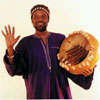
 |
The MA Museum Studies Course is unveiled at BU |
Learning from key thinkers and professionals in the world of museums and cultural heritage management including visiting Professors Stuart Davies, creator of ?Renaissance in the regions? and Peter Howard, editor of the International Journal of Heritage Studies.
Focus on contemporary collecting of the intangible and tangible cultural heritage, guest lecturers include Zimbabwean mbira master Chartwell Dutiro.
Yvette Staelens, Programme Leader, was formerly Deputy Director of AMCSW and has a portfolio of over 20 years museum professional experience.
Recent graduates have found employment at Bovington Tank Museum, The Design Collection , The Museum in The Park, Stroud, Plymouth Museums, Greek Embassy cultural department.
Hampshire County Council Museums and Archives Service provide tutors, museums and collections for much of the teaching. This allows students ?hands-on? collections access and up to the minute insight into current museum issues. As leader of the SE Hub, Hampshire is at the centre of museum development in the region.
The course provides students with an exceptionally high level of practical and theoretical training. Learning is through seminars, museum and heritage site visits, tutorials, lectures, and supported self-study.
The principal areas of study are:
In addition students will study and develop generally applicable skills such as:
During the second term students research and prepare a public exhibition of their own choosing, which is mounted in a Hampshire Museum at the end of the academic year. Professional assistance is provided by Hampshire County Museums. This is a key element of the programme which enables students to consolidate their acquired skills in a professional context.
Students also undertake a 15,000 word personal research project (dissertation) which may reflect either a chosen academic discipline, for example archaeology, natural sciences, local history,etc., or an area of museum work in which they wish to specialise, perhaps collections management, education, community history, etc. Individual tutors supervise this study which may be co-supervised by museum staff in some instances.
Fieldwork and practice is a vital component of the programme and the 20-day supervised placement provides crucial industry experience and contacts required to further a museum career. Museum professionals undertaking the programme part time may apply for ?Accreditation of Prior Learning? with regard to this element of the course. Students are supported in finding a suitable institution and overseas placements are possible.
Visits to museums and galleries are an important feature of the course with an total immersion museum visits week at the course outset. Local, large and small independent and national museums are included, also designated collections.
There are no written examinations. Assessment is through:
For further information please contact Lisa Asquith in the Postgraduate Programmes Department or call +44 (0) 1202 965419
06/09/06